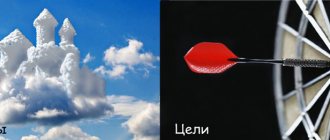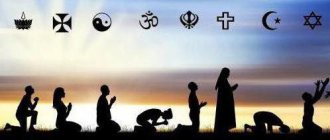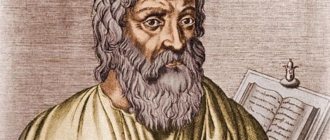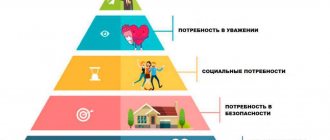Self-knowledge in a person’s life begins almost from birth. This process is quite complex in its structure. It is present in every age period of a person, but the degree of its severity varies. Self-knowledge most often intensifies during adolescence and youth. But in old age it declines, but there are exceptions.
Free online seminars you might be interested in:
>> Webinar: Secrets of the Runes
>> Webinar: Mantika, runes and forces of nature
>> Online training: Introduction to the chakra system
>> 3-day online intensive: Metaphorical cards
Results of self-knowledge and the process of self-knowledge
In the course of self-knowledge, a person gets to know himself. This knowledge can be divided into groups. For example, emotions, character traits, behavioral characteristics, intellectual properties. They are also called constructs. They form a self-image, on the basis of which the self-concept is formed.
If we highlight the general results of self-knowledge, then this is a sense of personal competence. What does it consist of? The first is the feeling that we are all similar, i.e. identical. And the second is that we accept ourselves entirely and completely, with pros and cons, positive and negative qualities. A person does not resist himself, while he has a desire to grow, develop and change something in himself, but this happens gradually.
As feelings of identity and self-acceptance emerge, self-esteem emerges. This feeling expresses the degree of sympathy a person has for himself.
And, identity, self-esteem and self-acceptance contribute to a sense of self-competence. How does it manifest itself? In the fact that a person accepts himself, his characteristics, he can make important decisions himself and determine his destiny.
Conclusion
After a person has realized his true purpose and achieved the unity of body, soul and mind, he feels a surge of strength and energy, becomes active and purposeful. Meditative practices lead to a state of peace and mental balance. A person begins to easily adapt to various stressful situations and does not react to stimuli that previously brought him out of balance.
A person becomes the arbiter of his own destiny, the master of life. He does not seek to change the outside world and does not wait for the mercy of nature; he changes himself, improves, develops, and achieves his goals. He easily accepts failures and defeats, quickly restoring emotional balance.
Meditation and other spiritual practices help heal the soul and strengthen physical and mental health. After using these techniques, a person stops withdrawing into himself and expands the horizons of his knowledge.
In esotericism there is such a postulate: know yourself, and you will know God. The soul will have to go through many incarnations, after which it will find itself and find peace, which is a sign that the path has been chosen correctly.
To develop and know yourself, you need to be open to everything new, not cling to outdated beliefs and dogmas, face your fears and defeat them. In this way, you can lift the veil of secrecy and find your own niche in this world. By listening to our inner voice, which guides us in the right direction, we can achieve a lot.
The process of self-discovery
The process of self-knowledge is a complete awareness of oneself, character, and essence. By the way, it is self-knowledge that distinguishes a person from other inhabitants of our planet, for example, animals. In all beliefs and religious movements, self-knowledge is defined as a means of recognizing and understanding one’s community with God. This is especially evident in Eastern religions.
It is quite simple and clear that a person determines his life path. Chooses between several options, sets a goal, performs actions, interacts with others. Thanks to this, he begins to be an interesting person, both to those around him, and he begins to enjoy spending time with himself.
Examples from history
Vivid examples of how self-knowledge acts as an engine of spiritual, cultural, scientific and technological progress can be found in history.
For example, the principle of yoga “Ahimsa” or non-violence is the fruit of spiritual quest, self-knowledge and the search for truth within oneself.
This principle implies the rejection of cruelty and eating animal food as a form of cruelty. This concept of behavior was developed by followers of yoga and was born through self-knowledge.
Ways of self-knowledge
- Self-observation is considered the beginning of the entire process of self-knowledge. During it, a person observes himself. Using this method, a person increases his awareness. Here you must focus on what is happening inside you, on what feelings you are experiencing.
- Introspection. When you analyze yourself, you look at your behavior and reactions. You are trying to understand why you did what you did and nothing else. Psychologically, self-analysis is considered the most difficult.
- Comparison. Here a person, willy-nilly, compares himself with others. This is their nature. As a result of comparisons, a person gets to know himself better.
- Self-acceptance. Here a person accepts himself completely and without reserve. He is aware of his strengths and weaknesses and is ready to improve himself.
Functions
To summarize, the basic functions of self-knowledge can be called introspection and introspection . In addition, when considering the issue in detail, the functions of the process of self-knowledge include:
- Understanding yourself (working with detailed knowledge about yourself).
- Increasing personal significance (choosing positive knowledge about yourself and working with it).
- Self-test (comparing your own knowledge about yourself with the assessments of others).
Types of self-knowledge
There are several types of self-knowledge. Among them:
- Analytical – has a connection with the activities of our mind;
- Creative – connected with our feelings;
- Spiritual – associated with our religion, faith.
There are also indirect self-knowledge (when a person analyzes his own behavior) and direct self-knowledge (self-observation).
Analytical self-knowledge
Analytical self-knowledge occurs as a result of knowing oneself and observing oneself. A written analysis during self-observation helps to get to know yourself better. For example, keeping personal diaries. Another way is self-confession. In this case, you need to tell yourself about yourself. Sometimes this can be quite difficult, because defense mechanisms come into play. A psychologist can help here. But reflection is different from confession, because you will simply observe the process, without any assessment of yourself.
Human creative self-knowledge
Such self-knowledge allows you to get to know yourself better through games, going to the theater, general activities and social events. For example, playing in the theater. It has a positive effect on the psyche because internal resistance disappears. After all, this is a game, and the person there is an actor. This is where deep self-knowledge occurs.
Spiritual self-discovery
In this type of self-knowledge, a person chooses a certain method of spiritual self-knowledge. This could be yoga or spiritual practices. And using this method he begins to get to know himself, to analyze his own actions.
Role
What is the importance of human self-knowledge?
The role of self-knowledge is difficult to overestimate, since it is not just a function available to intelligent beings.
It is rather a tool with which you can achieve harmony, success and balance at all levels of life.
Through self-knowledge, you can achieve personal maturity and form an objective self-esteem. A person who is aware of himself, his strengths and weaknesses, can choose the right way to achieve his goals.
Thanks to self-knowledge, a person can understand his own desires, discarding externally imposed stereotypes and the desire to meet other people's expectations. This is very important because often we choose the wrong path.
For example, a born ballerina goes to study to become an accountant because her parents convince her of the rationality of such a choice. And a talented artist spends his whole life trying to please his mother, who dreamed of seeing him as a doctor.
As a result, people live an “alien” and unhappy life. But they cannot find that very saving thread that they can grab onto and get on the right path, because they are afraid to look into the eyes of their grievances, fears, attitudes, etc.
Self-knowledge fills life with meaning. After all, mechanical actions limited to earning a living and rare entertainment cannot replace the highest meaning and purpose of existence.
And a person who directs attention deep into his “I”, sooner or later finds his true purpose and begins to strive for high and fulfilling goals.
The result of self-knowledge is control over your own feelings. They are no longer a mystery to a person who has come to know himself. The nature of anger, envy, irritation, joy and sadness becomes obvious.
All feelings become in a person’s eyes not just a hurricane that captures the mind and deprives one of the will. They turn into logical, predictable and expected processes that can be analyzed and controlled.
Stages of self-knowledge
A person gets to know himself throughout his life. At each age stage, corresponding stages of self-knowledge occur.
- Self-recognition
Self-recognition is the initial stage of knowing yourself. It begins almost from the moment of birth. The child understands that he lives as a separate person. Look in the mirror, he recognizes himself.
- Self-concept
Self-concept is a person’s very stable understanding of himself and his characteristics. This concept is formed in the process of various life events.
- Self-esteem
Self-esteem determines how significant a person is to himself, how important his activities are, recognizing all the pros and cons. Here, the achievements of the person himself and his assessment by the people around him occupy a significant position.
Values in self-knowledge through yoga practice
Thanks to yoga and various spiritual practices, people can understand their inner world and become more aware of themselves. In yoga there are several steps that you need to go through. Thus, a whole list is formed, thanks to which a person has his values in order; a special place there is occupied by spiritual values, to which he strives throughout his life.
Need for self-knowledge
People often ask questions about the meaning of life and true values. How can a person understand himself and those around him? Such questions are the basis for the need for oneself. This need is inherent in every person. People are in an eternal search for the meaning of life; it comes first for them. After all, until we understand the meaning of life, we will not learn to understand ourselves.
Inner peace and self-knowledge
Where is the meaning of life? It is logical that it is inside us, not outside. When we understand this, our lives begin to change. From here appear monks who sell their Mercedes and say goodbye to their past life. It's not that simple here. Such people choose the path of spirituality, not because they feel like it right now, but in a week they will return back to their normal life. Here we are talking about the fact that they follow the path of spirituality throughout their lives.
Personal growth as a stage of self-knowledge
As a person develops, his or her level of self-knowledge increases. For example, at the beginning the child learns to distinguish himself from other people. Further, as he grows up, he develops beliefs about himself. And then he finds motivation that encourages him to improve his life and develop.
Techniques for using meditation
Meditation is a method of perceiving reality, realizing the depth of the inner world. It helps to balance the mind and body, achieve inner harmony and tranquility. To do this, there are various methods of meditation, thanks to which all chakras are worked on. Meditation can take place with music or in complete silence. Indian spiritual mentor Osho argued that any activity can be meditation. An important rule is to have a high level of awareness and presence in the current moment.
One of the most popular ways to get rid of unnecessary thoughts and emotions is a 15-minute practice. During this meditative practice, all negative manifestations of an emotional and physical nature are released.
During the process of meditation, the subconscious is activated, thoughts become light and bright, and inner freedom is felt. The duration of such meditation should be calculated individually, based on the emotional state. The average course duration is from 10 to 12 days. If during meditation a person feels comfortable and relaxed, and after finishing it observes changes for the better, then the duration of the course can be increased.
Methods of self-knowledge
Self-knowledge occurs at the moment when a person begins to realize that he is different from others. What methods does the person use?
- Personality modeling. This method detects emotions. Positive and negative emotions and feelings towards people that contribute to successful cooperation or provoke conflicts. This method allows you to assess your position in the world around you.
- Method of unity of antipodes. Thanks to this method, a person understands that he has a positive attitude towards someone and a negative attitude towards someone. You definitely notice that you behave differently with different people.
Structure
Self-knowledge consists of several elements:
- of “I” May also appear under the name "Ego". The definition includes a person's relationship to himself and his dominant ways/strategies/ways of interacting with others.
- Self-control . This is the subordination of one’s own behavior, state and actions to the standard accepted in society (through the volitional component).
- Self-esteem . A range of feelings towards oneself, which are reflected in an intermediate meaning between the polar categories of “acceptance” and “non-acceptance”.
Means of self-knowledge
Knowing the methods of self-knowledge, a person begins to use means of self-knowledge that help him develop his spiritual world. Such tools help you better begin to understand yourself.
- The first means is self-report. You can start a personal diary or blog where you can analyze the changes taking place in your life.
- Cinema, books, theater. It is necessary to read, go to shows, developing spirituality.
- Attending social and psychological events. Trainings help you to know yourself better.
- Don't be afraid to consult a psychologist. This is not a doctor, he will simply help you understand yourself better.
Self-knowledge and self-esteem
Self-esteem is one of the components of self-knowledge. A person evaluates himself and builds his own value system. Self-esteem can be normal (adequate), underestimated or overestimated.
It's no secret that arrogant people are too self-confident and have low self-criticism. Low self-esteem causes timidity, making a person withdrawn and shy. And adequate self-esteem allows a person to be confident in himself and evaluate his capabilities and strengths without distortion.
Self-concept theory as a stage of self-knowledge
When a person has formed an idea of himself, it is called self-concept. It includes: the personal “I” and the social “I”. The first shows how a person sees himself. And the second is how other people understand it.
This theory is based on two aspects: the desire to come into harmony with oneself and the opportunity to raise one’s self-esteem.
Self-concept has 2 vectors:
- objective is how we perceive ourselves in our lives;
- aspirational is a desired image of how we want to be perceived.
A person will always strive for the desired image in his life. This image can be based on a person in the past and at the present moment. Now the person has achieved significant results. Over time, the distance between the desired and the actual will shrink until it disappears.
Self-discovery exercises
These exercises allow you to better understand yourself. Thanks to them, a person improves himself.
For example, you can perform the exercise “4 squares of the psychology of consciousness.” You need to divide a sheet of paper into 4 squares. In the first you need to write your positive traits and qualities, in the third you need to write what you think are negative qualities. Then you need to write in the adjacent squares the antipodes of these qualities, completely opposite. You need to be as honest with yourself as possible and understand that there are no absolutely ideal people and personality traits. You should improve yourself and focus on the positives while working on the negatives.
Books for self-knowledge
In conclusion, we invite you to get acquainted with a selection of books about self-knowledge. They will help those who are already engaged in the study of self-knowledge, as well as those who are just starting.
- Colin Tipping "Radical Forgiveness";
- Jen Sincero "NOT SY";
- Eric Berne "Games People Play" People who play games";
- John Gray "Men are from Mars, women are from Venus";
- Viktor Frankl “Say Yes to Life!”;
- Kate Peterson “Live and Learn”;
- Richard Bach "Illusions".











